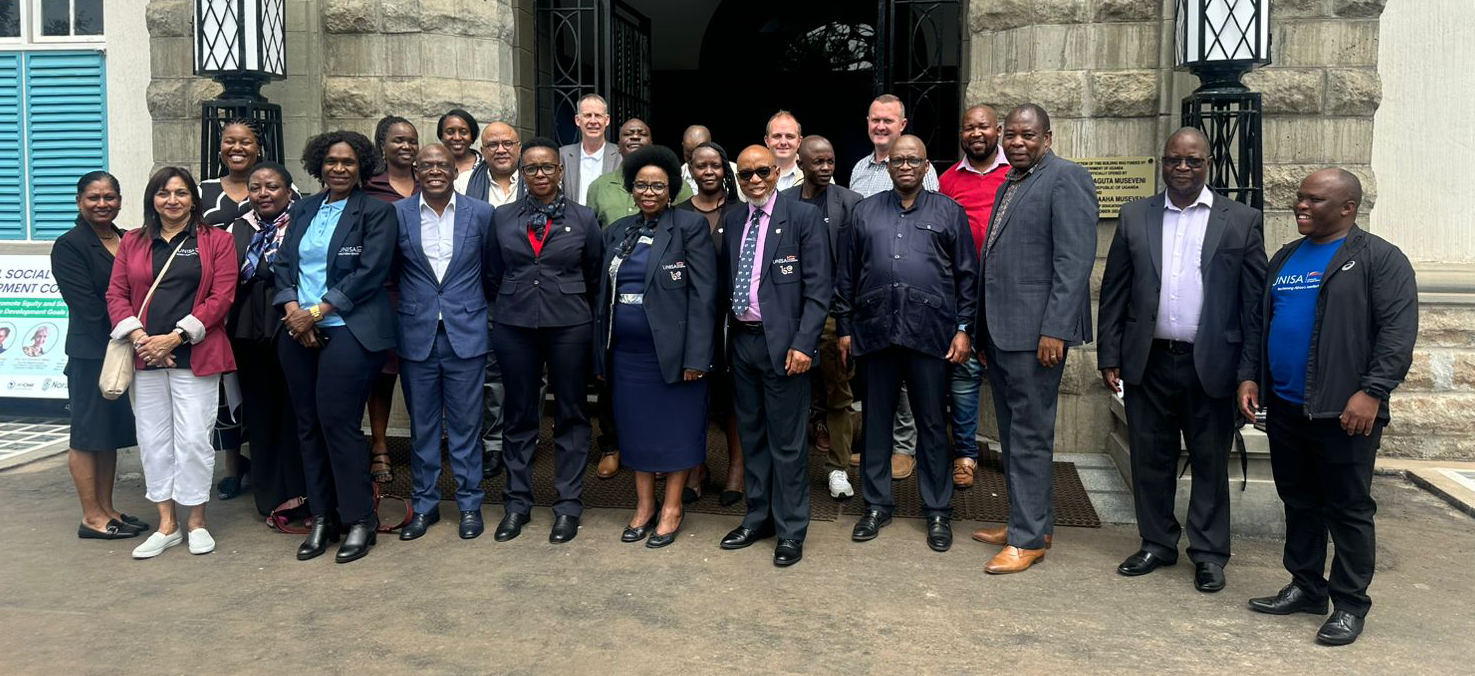

Prof Meahabo Magano and the Unisa benchmarking team
In 2024, Unisa Principal and Vice-Chancellor (VC), Prof Puleng LenkaBula, signed a memorandum of understanding (MoU) with Makerere University. With around 45 000 students, Makerere University is the largest university in Uganda. The MoU signed by these two prominent universities is underpinned by key initiatives of common interest, which include teaching, learning, research and community engagement, while also ensuring the deepening of research which addresses Unisa’s Catalytic Niche Areas.
Recently, Makerere University launched an Innovation Hub providing a wide range of work-integrated learning (WIL) opportunities for its students, promoting entrepreneurial skills and experience across its ten colleges. Academics and hub facilitators join forces to coordinate projects to support students from concept formulation to start-up.
To maximise the foundation laid by Unisa’s VC and to ensure that over the next three years the university can showcase tangible results, the Department of Tuition Support and Facilitation of Learning (DTSFL), under the leadership of Prof Meahabo Magano, was joined by a group of academics from the university’s Colleges of Agriculture and Environmental Sciences, Human Sciences, Economic and Management Sciences, and Science, Engineering and Technology, as well as regional office representatives from the Eastern Cape, Midlands, Gauteng, KwaZulu-Natal and North Eastern regions, for a WIL benchmarking visit to Makerere University. The delegation of 24 arrived in Entebbe on 15 June and engaged with Makerere University staff and students from 16 to 18 June.
Magano posited that WIL is a gateway for preparing registered students to enter the world of work. There are five recognised modalities of WIL at Unisa, all of which employ different strategies to immerse students and get them to apply their theoretical understanding and engage in real-world understandings, applications and practices.
Magano highlighted that the world of work is not static but should be considered as ever-changing, and that higher education institutions (HEIs) must continually keep pace with these changes and become leaders in addressing and accommodating them. Thus, HEIs play a pivotal role in producing quality graduates who are fit for today’s world of work. Upon graduation, they are ready to contribute to their countries’ economies.
She emphasised that the benefits of WIL are well documented and that an African WIL discourse is also growing. These benefits include enhancing student skills and experiences, making them more attractive to potential employers. It is, however, observed that effective implementation of WIL comes with its own unique management and procedural challenges. One of these challenges is the university's struggle to identify and nurture strong relationships with key stakeholders. As a result, students are not all afforded opportunities to gain the necessary practical skills and experience required by the relevant industries. With this benchmarking visit, Unisa aims to share and learn from African colleagues and to see, first-hand, how an African university has identified and addressed its challenges.
To scaffold and build a resilient WIL management structure within Unisa, the DTSFL began hosting a series of annual WIL Symposiums starting in 2022. The first symposium was a locally held event with the theme of WIL – a gateway for readying students for the world of work. This symposium was followed by another locally hosted theme, Sharing best practices and how-to ideas in a post-COVID-19 pandemic CODeL+ context, with an emphasis on placements and the supervision of cohorts. The 2024 symposium reached out to include a wider audience, which included African and European participants. The theme covered the deepening familiarity of the Unisa community with WIL.
The 2025 International Teaching and Learning Conference was not entirely focused on WIL, but did cover it. The theme for the conference was Connecting minds and bridging gaps. At the last two Unisa-hosted conferences, a Makerere colleague, Dr Mbidde, presented and showcased milestones her university had achieved through its newly established Innovation Hub.
This benchmarking initiative is a strategic move by Unisa to become better informed on how best to reconfigure and strengthen its own WIL management and internal operations to ensure academic departments and WIL students are adequately supported.
Magano concluded by stating that she’s confident in achieving the objectives set for the benchmarking visit and that her diverse team will represent Unisa and its programmes in a spirit of sharing and brotherhood.
On the first day, the Unisa delegation met with various staff members from Makerere University, and introductions were made. A short presentation was made, highlighting the ten university colleges. Thereafter, Dr Mbidde highlighted the Innovation Hub, with its research-driven focus, UNDP seed funding, and incubation centres aimed at supporting students and academics to achieve their programme outcomes through the commercialisation of research.
The Unisa delegation was taken on a walking tour of the campus, which is open to the community. The tour ended at the College of Computing and Information Sciences, where several short presentations were provided on topics such as the use of AI to support students and the development of air pollution detectors, among others.
The day ended with the delegation returning happy and tired to their hotels and, on the way, getting introduced to the Boda Boda (motorcycle taxis).
* Submitted by Gladwell Marebane, Deputy Director: Tuition Support, DTSFL
Publish date: 2025-06-19 00:00:00.0